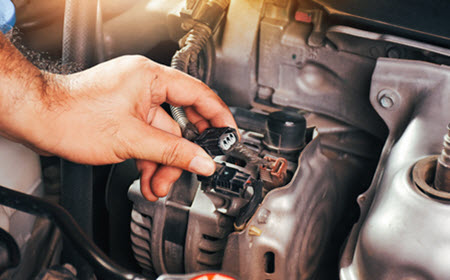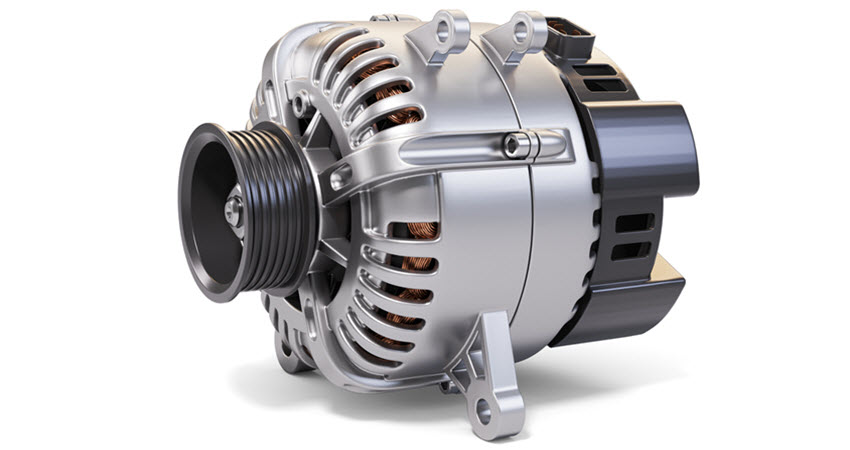Audi has long been known for its luxury vehicles, and drivers have come to expect a certain level of quality and reliability from the brand. Audi’s reputation for excellence is well-deserved – their cars are stylish and well-crafted, with a focus on safety and performance. In recent years, Audi has also made a name for itself with its innovative technologies, such as quattro all-wheel drive and LED headlights. These cutting-edge features have helped to make Audi one of the most popular car brands on the market. Whether you’re looking for a comfortable daily driver or a flashy sports car, Audi has a model to suit your needs. With their combination of luxury and reliability, it’s no wonder that Audis are so popular among drivers.
However, even the best-made car can experience problems from time to time. One potential issue that Audis may experience is alternator failure. The alternator is responsible for charging the battery, and if it fails, the battery will quickly become depleted.
What is the alternator?
The alternator is a vital component of your car’s electrical system. It converts mechanical energy into electrical energy, which is used to power the headlights, windshield wipers, and other accessories. The alternator also charges the battery, which provides power when the engine is not running. When the engine is running, the alternator belt turns the alternator pulley, which spins the alternator rotor. The rotor produces an alternating current, which is converted into direct current by the rectifier. The direct current powers the car’s accessories and charges the battery. If the alternator fails, the battery will eventually run out of power, and the car will stall. For this reason, it is important to have a reliable alternator in your car.
Signs of Alternator Failure
Alternator failure can be difficult to diagnose, as the symptoms can mimic those of other problems. However, there are a few tell-tale signs that your alternator may be on the fritz. If you notice that your headlights are dimming or flickering, it could be a sign that your alternator is not providing enough power. Another symptom to watch for is unusual behavior from your car’s electrical systems; if your radio starts behaving erratically or your power windows become sluggish, it could be due to a failing alternator.
Finally, if you notice that your car is having trouble starting, it could be a sign that the alternator is not providing enough power to the starter motor. If you notice any of these symptoms, it’s important to have your car checked by a trained mechanic as soon as possible.
How to Prevent Alternator Failure
Alternator failure is one of the most common causes of car breakdowns, and it can be incredibly frustrating (and expensive) to deal with. There are a few simple things you can do to help prevent alternator failure, however. One of the most important is to regularly check the belts that connect the alternator to the engine. These belts can wear out over time, causing the alternator to work less efficiently. If you notice any cracks or damage, replace the belt as soon as possible. Another good idea is to have your alternator checked regularly by a trusted mechanic. They will be able to spot any potential problems and make sure that everything is in good working order. By following these simple tips, you can help prevent alternator failure and keep your car on the road for longer.
Bring Your Audi to Bay Diagnostic
Cars are a lot like people; they  need regular checkups and maintenance to stay healthy and running smoothly. Just as you would visit a doctor if you were feeling under the weather, your car needs to see a mechanic when it isn’t running properly. If you think your Audi might have alternator failure, Bay Diagnostic is the place to go. We are experts in Audi repair and will be able to diagnose and fix the problem quickly and efficiently. Plus, we’re located in Brooklyn, convenient to Manhattan and New York, NY, so you don’t have to go far to get the best care for your car. So if your Audi is giving you trouble, bring it to Bay Diagnostic and we’ll have you back on the road in no time.
need regular checkups and maintenance to stay healthy and running smoothly. Just as you would visit a doctor if you were feeling under the weather, your car needs to see a mechanic when it isn’t running properly. If you think your Audi might have alternator failure, Bay Diagnostic is the place to go. We are experts in Audi repair and will be able to diagnose and fix the problem quickly and efficiently. Plus, we’re located in Brooklyn, convenient to Manhattan and New York, NY, so you don’t have to go far to get the best care for your car. So if your Audi is giving you trouble, bring it to Bay Diagnostic and we’ll have you back on the road in no time.

 1717 Gravesend Neck Road,
1717 Gravesend Neck Road,



